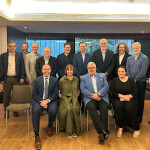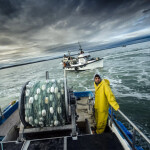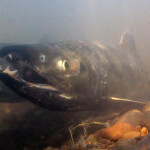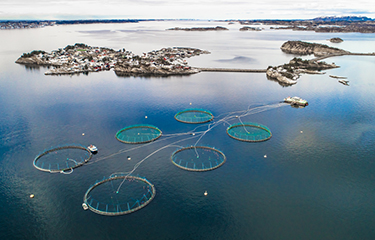With the lowest carbon footprint, lowest feed conversion ratio and lowest land use, farmed salmon continues to be one of the most eco-efficient forms of animal protein, according to the Global Salmon Initiative (GSI).
GSI’s latest annual sustainability report, which provides six years of data across 14 indicators for over half of the global salmon industry, states that farmed Atlantic salmon has a feed conversion ratio of 1.2 to 1.5, compared to poultry (1.7 to 2), swine (2.7 to 5) and beef (6 to 10). Salmon’s carbon footprint for a typical 40-gram edible serving is 0.6 grams, while poultry’s is 0.9 grams, swine’s is 1.3 grams and beef’s is 5.9 grams.
The report also highlights that thanks to technological advancements and best-practice sharing there has been a 50 percent decrease in the use of sea lice treatments over this period, coupled with a 120 percent increase in the use of non-medicinal methods.
Similarly, it finds that innovations in the sourcing of feed ingredients have led to reductions in the amount of fishmeal and fish oil used by the sector of 17 percent and 9 percent respectively. Overall, there has been an 11-percent decrease in the amount of marine ingredients used in the feeds.
Meanwhile, more than 620,000 metric tons (MT) of salmon farmed by GSI members is now certified to the Aquaculture Stewardship Council (ASC) standard. Coming from over 185 farms worldwide, this represents almost 60 percent of their total production.
“As we share the 6th year of sustainability data, it is interesting to see that the areas we identified as priority for the GSI to work on (biosecurity, sourcing of sustainable feed and independent certification) and the areas showing greatest progress in the report are the same," Alf-Helge Aarskog, CEO of Mowi and co-chair of GSI, said. "Clearly this shows that if we focus and coordinate efforts we can have a significant impact on improving environmental performance.”
The group has also started to focus on innovation as one of the sector’s main drivers for environmental improvement.
“Through the collective power of the group, we have the means to mobilize and initiate the further advancement of novel ideas – something we have observed has real impact when it comes to disease management and improving feed efficiencies, both areas where the report shows significant progress,” Avrim Lazar, convenor of GSI, said.







